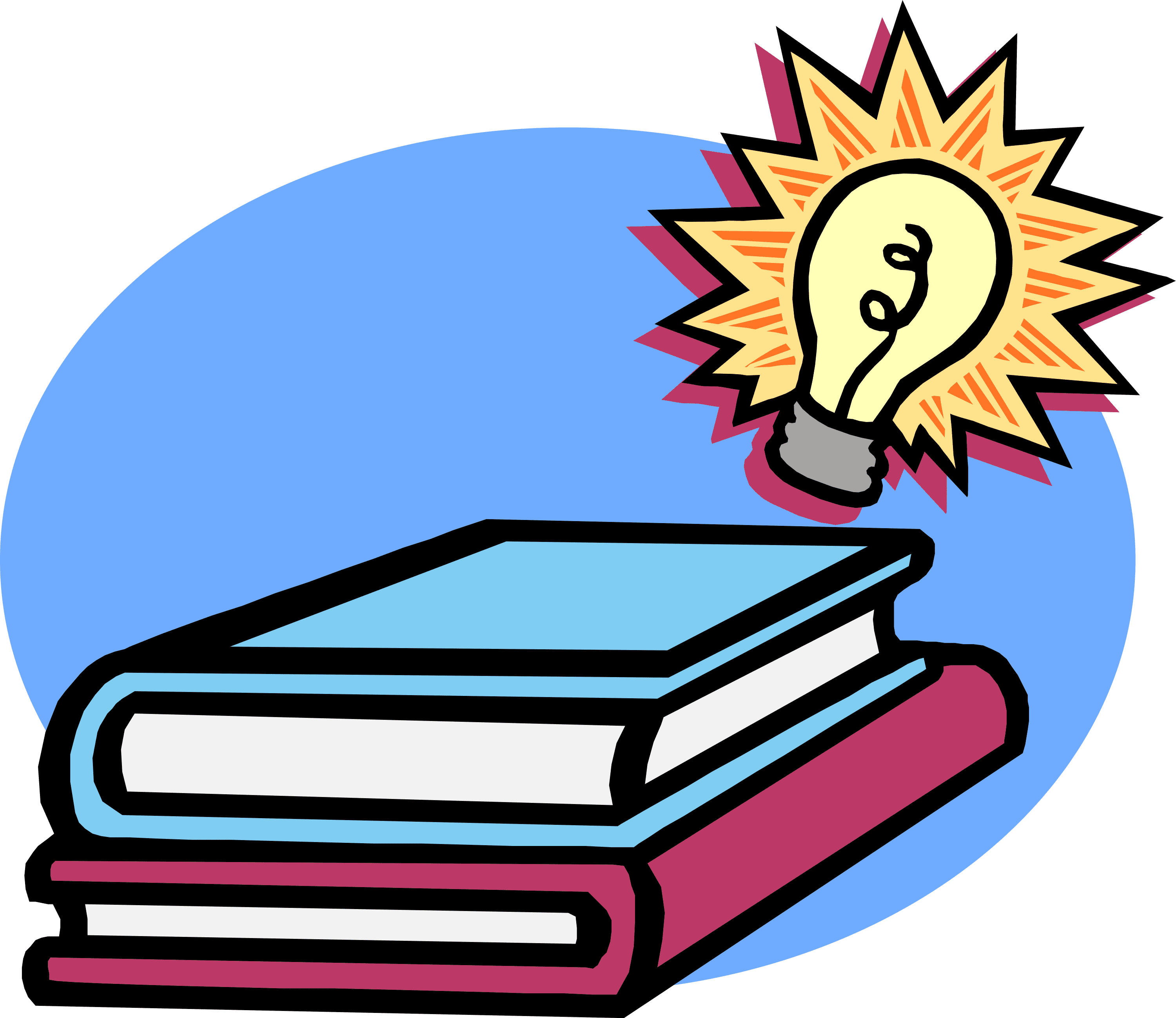Ответ к заданию
Dear Spotlight on Russia,
My name is Emily and I’m 12 years old. I go to school in London, UK. I read Andrew’s questions about Russian schools and I found them very interesting. Here are some answers to his questions about my school:
– In Year 1, we are usually 5 or 6 years old. We have 6 years of primary school, 5 years of secondary school, and 2 years of college or sixth form.
– We have different teachers for each subject from Year 7 (when we start secondary school) onwards. In primary school, we have one class teacher for most subjects.
– Our school year starts in early September and ends in late July. We have three short holidays and a six-week summer holiday.
– We study a range of subjects, including English, maths, science, history, geography, art, music, PE, and languages (I’m learning French and Spanish).
– We don’t have a school uniform, but we have a dress code that we have to follow.
As for the survey, my favorite school subject is art. I love being creative and expressing myself through different mediums.
Best regards,
Emily
Schools In Russia Posted by Nadya on Aug 31, 2020 in Russian life, Traditions, Vocabulary, when in Russia
The First of September (пе́рвое сентября́) is Knowledge Day (День зна́ний) in Russia. It is the official school start date. Pupils on this day return to schools (шко́лы), colleges (ко́лледжи), and universities (университе́ты). You can read more about how Russian children and their parents prepare for school and celebrate this day here.
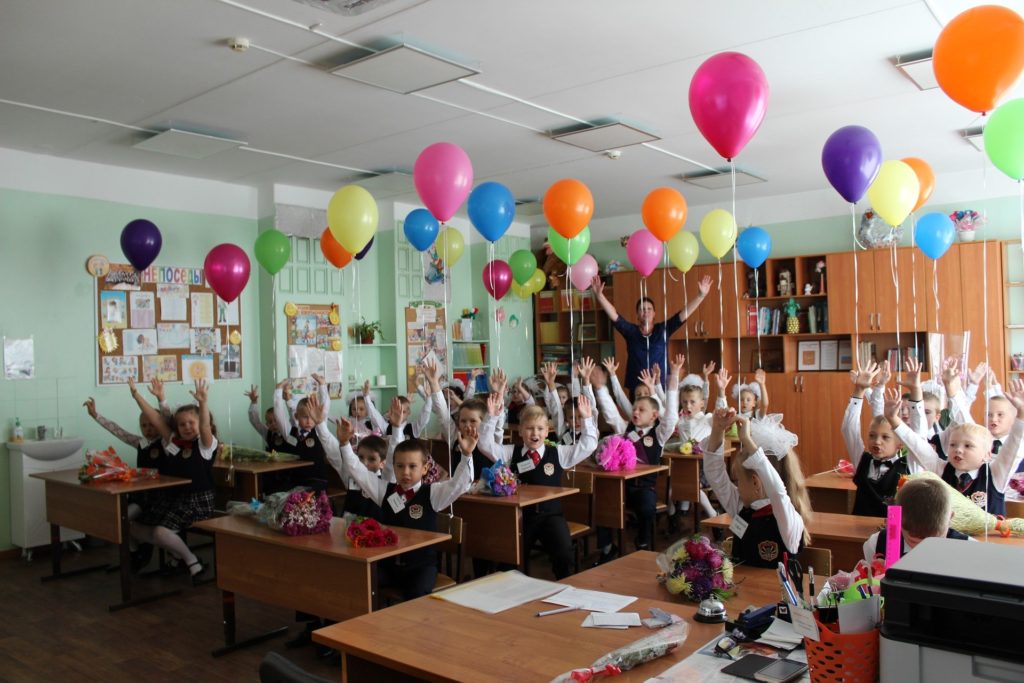
Image by Romoanna Pixabay
Today we will talk about a typical Russian school. “Шко́ла” (noun, feminine) sounds a bit similar to the English “school”.
Both terms are derived from the Greek “σχολή” (scholē). But the word came to the Russian language through the Polish “szkoła” (schola).
Я так ра́да верну́ться в шко́лу! – I am so excited to go back to school!
School in Russia is an institution for general (о́бщее) education (образова́ние). It also can be applied to additional educational institutions as music (му́зыка), art (иску́сство), sports (спорт) schools with the focus on developing children’s creative potential (тво́рческий потенциа́л).
Мой сын хо́дит в худо́жественную шко́лу по суббо́там. – My son goes to art school on Saturdays.
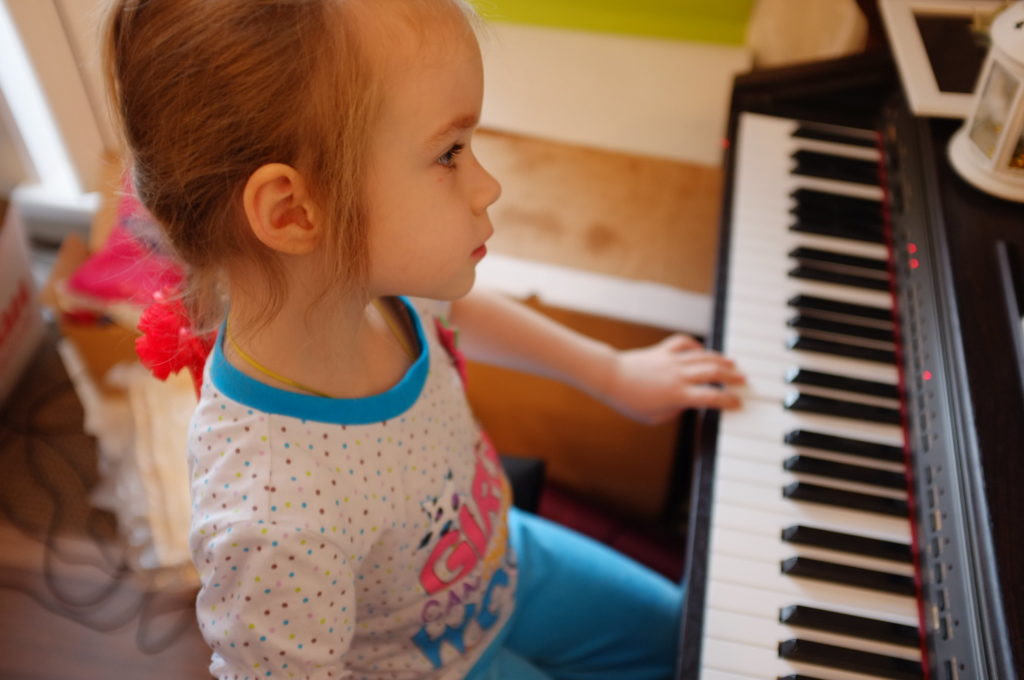
Image by Alexander Lyubavin Flickr
The full program (програ́мма) consists of eleven years of schooling. There are three levels in general education: elementary school (нача́льная шко́ла) – grades (кла́ссы) 1 to 4, middle school (сре́дняя шко́ла) – grades 5 to 9, and high school (ста́ршие кла́ссы) – grades 10 and 11.
Нача́льная шко́ла нахо́дится на пе́рвом этаже́. – The elementary school is on the first floor.
After the ninth, students (ученики́) may choose to continue schooling (учёба в шко́ле), go to college, or get a job. At the end of the last grade, students take exams (экза́мены) in some subjects (предме́ты). After successfully passing them, a Certificate of Basic General Education (“Аттеста́т об О́сновном О́бщем Образова́нии”) (nine years completed) or Certificate of General Education (“Аттеста́т о Сре́днем О́бщем Образова́нии”) (eleven years completed) will be awarded.
Вы реши́ли, чем заня́ться по́сле оконча́ния шко́лы? – Have you decided what to do after high school graduation?
For the first year, children are accepted from 6-7 years old, depending on the individual development of each child.
Ва́ня пошёл в шко́лу с пяти́ лет. – Vanya started school at the age of five.
Students of each grade are divided into classes (кла́ссы). Each class usually has up to 30 pupils (ученики́) who always go to lessons (уро́ки) together throughout the 11 years. Each class is named with a letter, for example, 2 “B”.
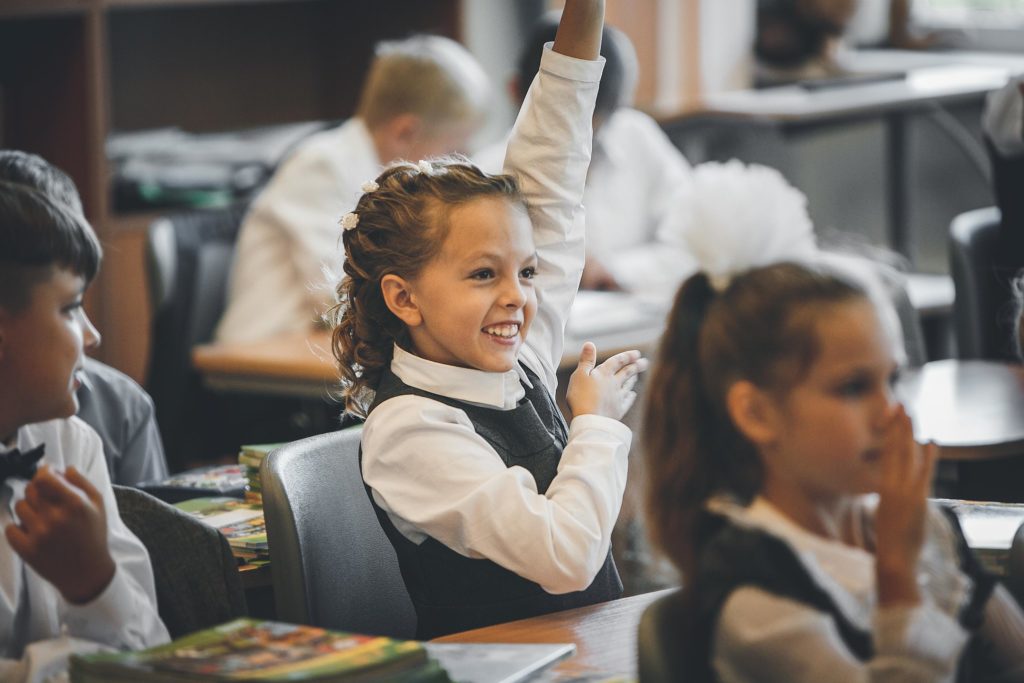
Image by vazovsky Flickr
Да, э́та де́вочка у́чится в на́шей шко́ле в восьмо́м “Е”. – Yes, this girl is in our school in the eighth “E”.
The state school curriculum (шко́льная програ́мма) is usually pretty fixed; not a big choice of subjects are available to study besides the required onesglocke@transparent.com.
Жаль, что в на́шей шко́ле нет уро́ков психоло́гии. – Too bad there are no psychology lessons in our school.
Private schools (ча́стные шко́лы) are uncommon in Russia. They emphasize learning some specific skills (на́выки) in foreign languages (иностра́нные языки́), sciences (есте́ственные нау́ки), physics (фи́зика) and mathematics (матема́тика), etc. In government-funded specialized schools – lyceums (лице́и) and gymnasiums (гимна́зии) – in-depth study of individual subjects is also provided.
По́сле 9 кла́сса меня́ перевели́ из шко́лы в лице́й. – After the 9th grade, I was transferred from school to lyceum.
The Russian school year comprises four terms with vacations in between and extends from September 1 to the final week of May, with exams in June.
Пришло́ вре́мя верну́ться в шко́лу. Уда́чи всем ученика́м в но́вом уче́бном году́! – It’s time to go back to school. Good luck to all students in the new school year!
School Life — Школьная жизнь
Рейтинг: / 0
- Подробности
- Просмотров: 1093
Share
Класс!
Поделиться
School Life
I am a pupil of the 11-th form, I study at school
number 9. I would like to tell your about our school life.
I go to school five days a week. Our classes start at
8 o’clock a. m. and last till 3 o’clock p.m. So we have 6 or 7 lessons a day.
We study many different subjects: Russian, English, French, literatures,
history, geography, biology, physics, chemistry, mathematics, programming and
computer sciences.
Languages, literature and history are my favourite
subjects. I make good marks in these subjects. The school year is divided into
four terms, called quarters. It begins on the 1st of September known as a Day
of knowledge and finishes in May.
Each quarter is followed by holidays. Every pupil has
a day-book where the teachers put down the marks, that pupil has earned at the
class. During the classes pupils are to answer the teacher’s questions, do some
exercises, write sentences, count, read.
The pupils are often called to the blackboard. After
every lesson the teachers give us home assignment. At the next lesson the
teachers check them up. To do good at school one should make home assignments
regularly, be active at the lessons and spend at least two-three hours every
day studying.
I like studying. My favourite proverb is «Live
and learn».
Школьная жизнь
Я — ученица одиннадцатого
класса, я учусь в школе № 9. Я хотела бы рассказать вам о нашей школьной жизни.
Я хожу в школу пять раз
в неделю. Наши занятия начинаются в 8 часов утра и продолжаются до 3 часов дня.
Значит/(поэтому) у нас шесть или семь уроков в день. Мы изучаем много разных
предметов: русский, английский, французский языки, литературу, историю,
географию, биологию, физику, химию, математику, программирование и информатику.
Мои любимые предметы —
языки, литература и история. Я получаю хорошие оценки по этим предметам.
Школьный год разделен на четыре периода, называемых четвертями. Год начинается
1 сентября, известного как День знаний, и заканчивается в мае.
После каждой четверти
есть каникулы. У каждого ученика есть дневник, в который учитель ставит
полученные учеником оценки. Во время урока ученики должны отвечать на вопросы
учителя, выполнять упражнения, писать предложения, считать, читать.
Часто учеников вызывают
к доске. После каждого урока учитель задает домашнее задание. А на следующем
уроке проверяет его. Чтобы хорошо учиться в школе, нужно постоянно выполнять
домашние задания и заниматься уроками хотя бы по два-три часа в день.
Мне нравится учиться.
Моя любимая пословица такая: «Век живи, век учись».
Questions:
1. What school do you study at?
2. What time do the lessons begin?
3. What subjects do you study at school?
4. What are your favourite subjects?
5. How many lessons a day have you got?
6. Do you regularly make the home assignments?
Vocabulary:
to last — продолжаться
programming — программирование
computer science — информатика
favourite — любимый
to divide — разделять
quarter — четверть
day-book — дневник
to earn a mark for the answer — получать оценку
home assignment — домашнее задание
to check up — проверять
regularly — регулярно
proverb — пословица
live and learn — век живи, век учись.
Слайды и текст этой презентации
Слайд 2Schools in the UK and Russia Children
in the UK start school when they are five and
stay at school until they are sixteen or older.
Children in Russia start school when they are seven and stay at school until they are sixteen or older.
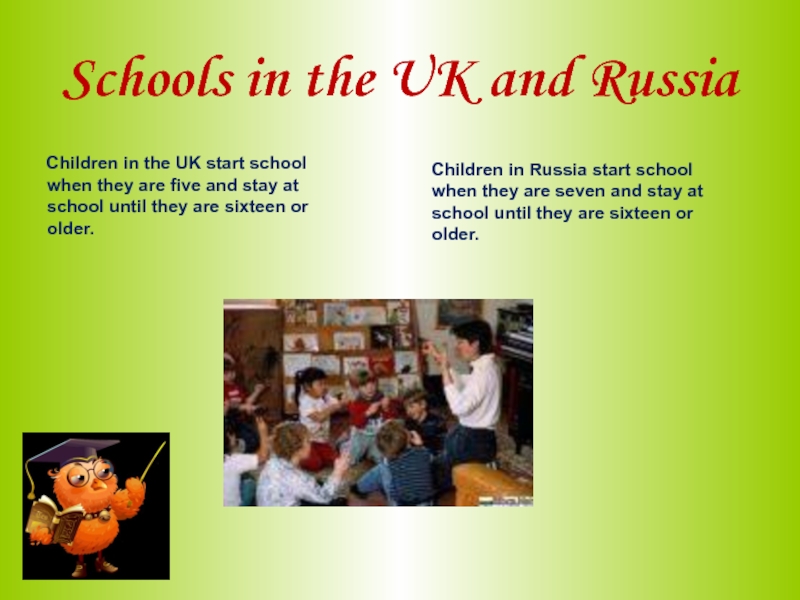
Слайд 3Schools in the UK Many children
in Britain attend nursery school from age of about three,
but these schools are not compulsory. Compulsory education begins at the age of five, when children go to primary school.
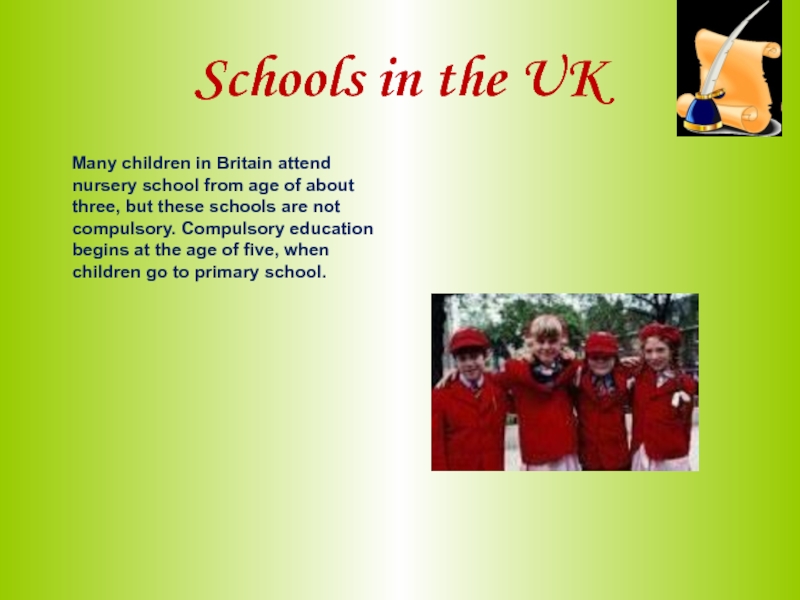
Слайд 4Schools in the UK and Russia
Primary education in the UK lasts for six years.
They attend the infant school from five to seven and then junior school until they are eleven. Then pupils go to secondary school.
Primary education in Russia lasts for four years. They attend the primary school from seven to eleven. Then students go to secondary school.
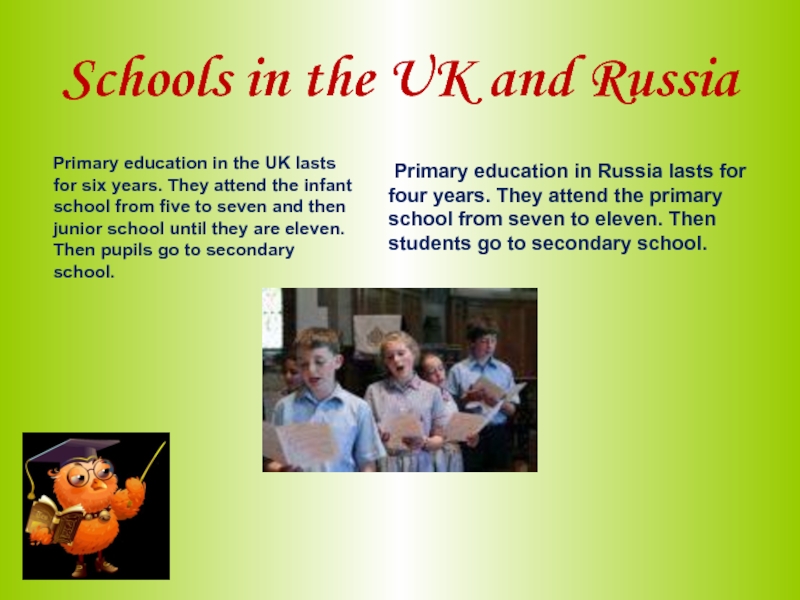
Слайд 5Schools in the UK and Russia Children study 10
and a Foreign Language.
Russian children in primary school study 8 subjects: Russian, Maths, Reading, Music, Art, PE, Handicraft, English.
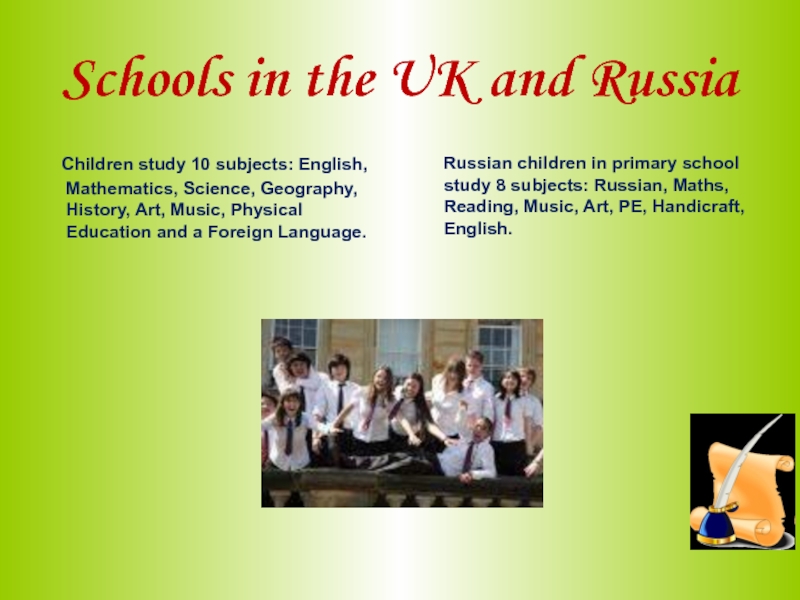
Слайд 6Schools in the UK Most secondary schools
teach French and some schools offer Spanish, German, Italian and
Russian. The first three are called “core” subjects. Pupils take examinations in the core subjects at the age 7, 11 and 14.
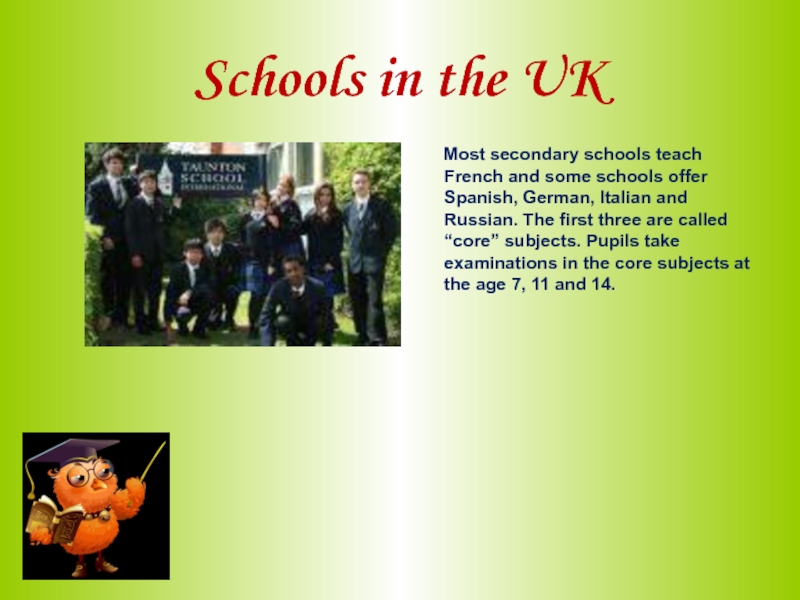
Слайд 7Schools in the UK and Russia
After five years of secondary education, pupils take the
General Certificate of Secondary Education examination. Most pupils take examinations in all subjects.
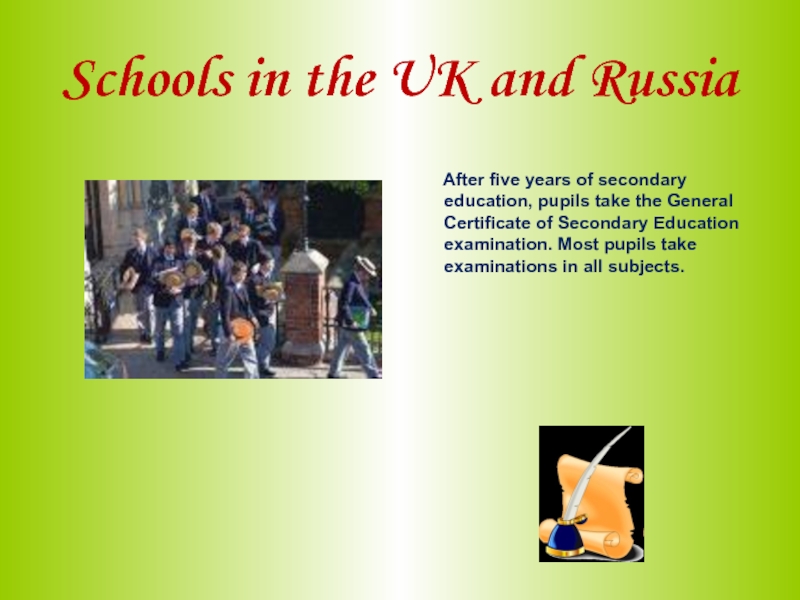
Слайд 8Schools in the UK and Russia Compulsory
education ends at sixteen. Some people choose to stay at
secondary school for a further two years. Other people leave secondary school at sixteen and go to colleges or further education.
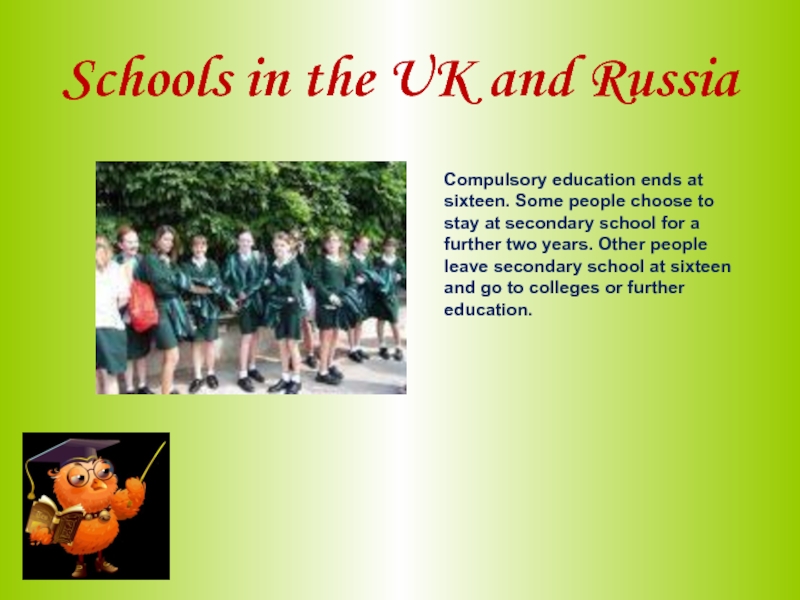
Слайд 9Schools in the UK and Russia Higher
education begins at eighteen and usually lasts for three or
four years. Students go to universities, polytechnics or colleges of higher education.
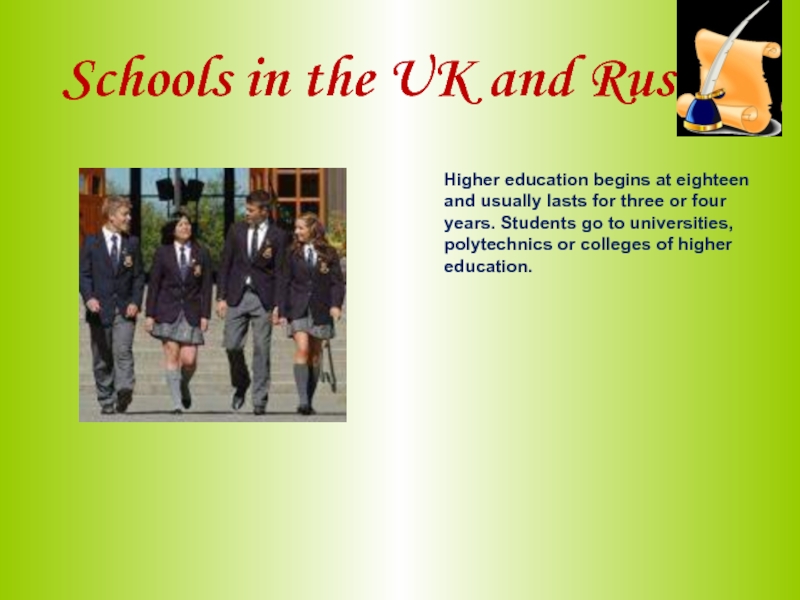
Слайд 10Schools in the UK and Russia Some
they pay for their education.
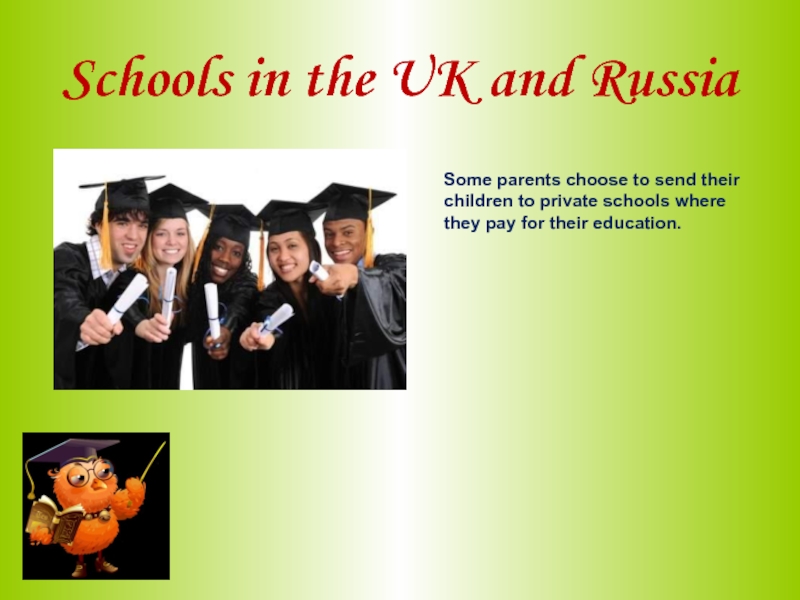
attend state schools.
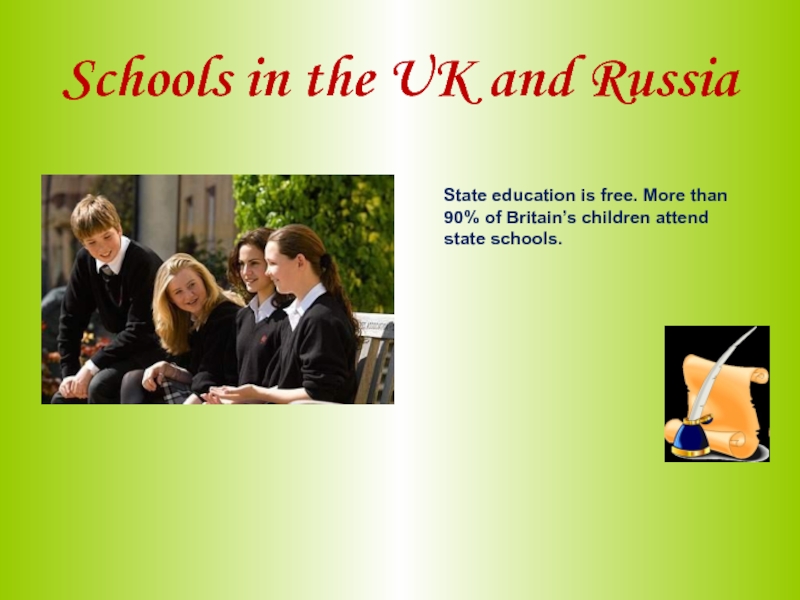
Слайд 12Schools in the UK Age
Type of school3 –
5 years nursery school5 – 11 years primaryschool11 – 16 years secondary school16 – 18 years high school
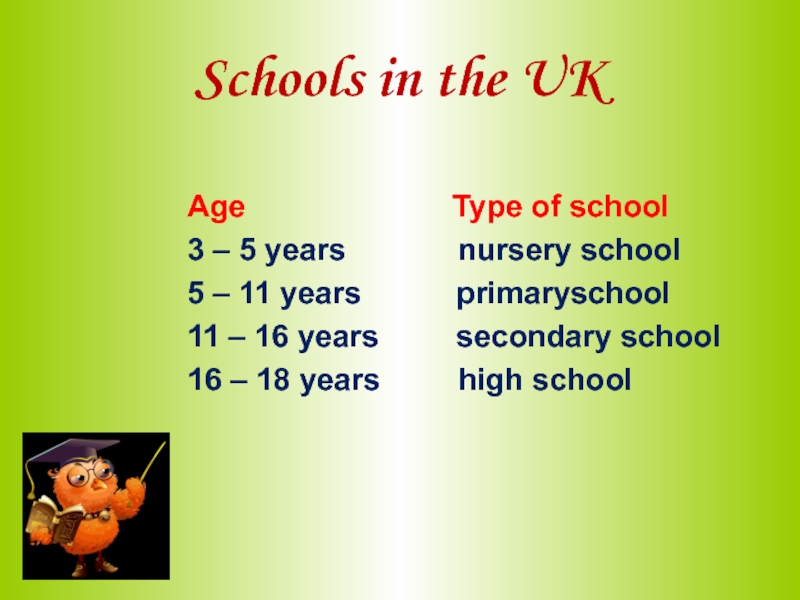
Слайд 13 School UniformSchool uniforms were first introduced in England by
Henry VIII and were called “bluecoats” because of blue jackets.
Then the popularity of uniforms increased and most schools had them. The uniform was different according to age, gender and even season (winter and summer uniforms). Nowadays the government in England tend to encourage the use of uniforms as a means of discipline and positive behaviour.
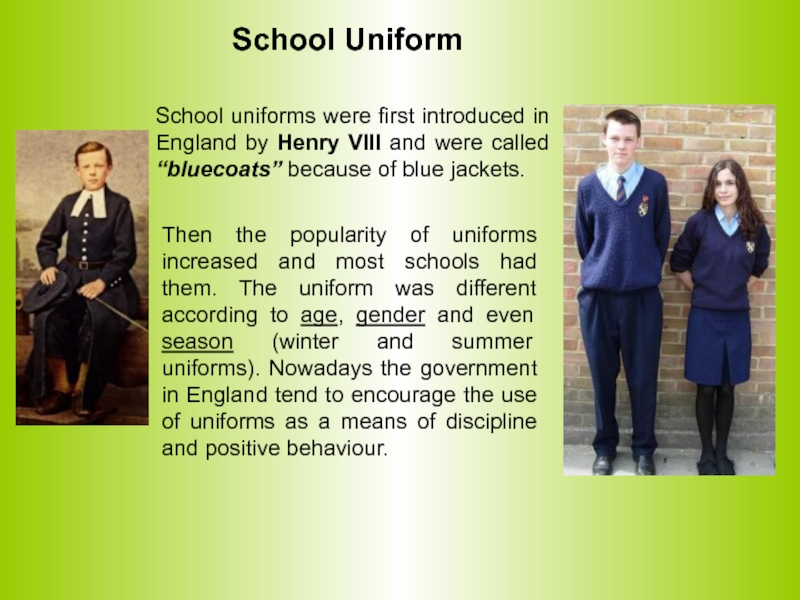
Слайд 16 Schools in England and America use
their own marks: letters or percentage A – 90-100 -excellent
, B – 80-89 – good, C – 70-79 – satisfactory, D – 60-69 bad, E – 0-59 poor.
Marks
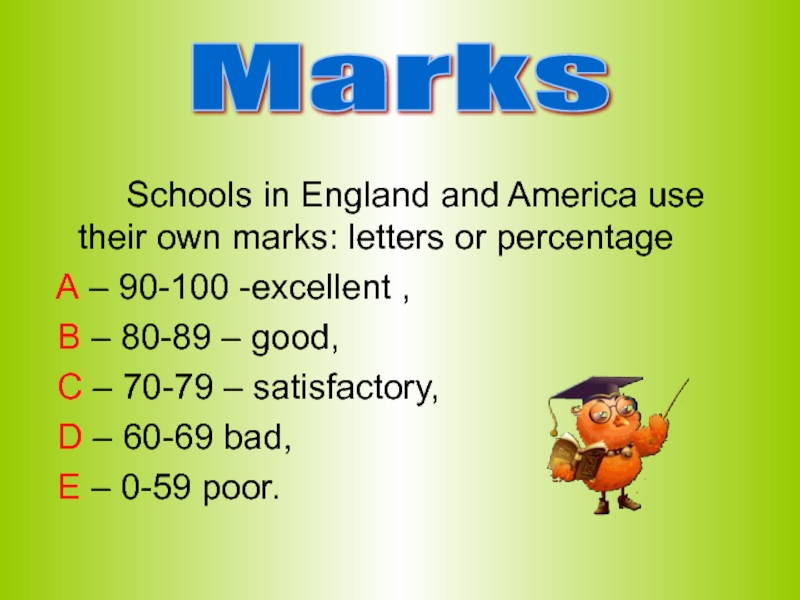
Слайд 19Schools in the UK and RussiaAnswer the questions:
UK RussiaWhen does compulsory education start? 5 7How long does primary education last? 6 (11) 4 (11)How long does secondary education last? 5 5Which subjects do children study at school?Is education in Britain free? Yes YesWhat sport do children do? Football, volleyball, basketball, hockey…Do children wear uniform? Yes Yes
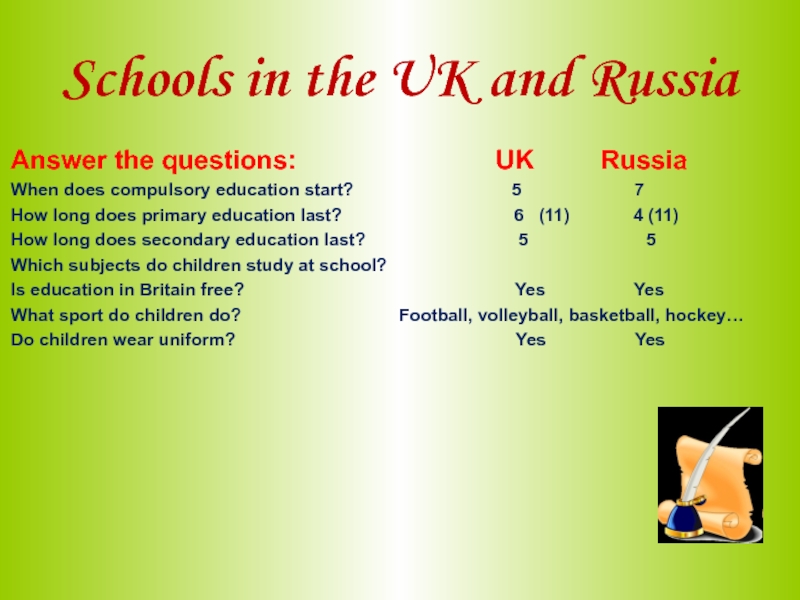
Слайд 20Schools in the UK and Russia Презентацию подготовила
Описание и ответ на задание[править | править код]
A. In the group of British students we met in summer there were some who wanted to know more about Russian schools. Try to answer some of their questions.
1) How big is a typical Russian school? — Typical Russian school is very big in big cities. There are more than 30 pupils in typical classes. But if you go to some villages, schools are small, there are from 2 to 10 pupils in a class.
2) Do you wear a uniform at your school? — In typical state schools we don’t have uniform.
3) How many school holidays do you have each year? — We have four school holidays periods each year: one in autumn, winter, spring and summer.
4) How long is your school day? — We have classes for 4-5 hours a day.
5) Must all the pupils learn a foreign language? — Yes, all the pupils must learn a foreign language.
6) What are the teachers like in Russia? Are they strict? — It depends from the person and situation, sometimes teachers are very strict and sometimes not.
B. Think of what you can say to a British teenager about your class and your school. You can use these ideas:
1) you and your classmates; if you are good friends, what you like to do together; — Yes, my classmates and me are good friends and we like to play football after school.
2) what your school building is like; what you have in your school; — Our school is three stores building and there are typical classrooms, canteen and gym in our school.
3) what subjects you do at school; which of them you like and why; — I like physical training, it is fun to play different games and go in for sport. And there isn’t any home tasks. I also like biology, it is very interesting to study how life organized on our planet.
4) what your typical day at school is like; — I come at school at 8 o’clock and we have 4-5 classes. In between classes we have so breaks and lunch. I leave my school usually at one o’clock.
5) whether you like your school and what makes you like or dislike it. — I like school, because there are a lot friends and we like to spend time together. I like some subjects, it is very interesting to know something new. I don’t like when we have a lot of home tasks to do. I don’t like when we have to a lot of information to memorize. I think it is very useless.
Перевод задания и ответа[править | править код]
А. В группе британских студентов, которую мы встретили летом, были некоторые, кто хотел узнать больше о русских школах. Попробуйте ответить на некоторые из их вопросов.
1) Насколько большие обычные школы в России? — Типичная русская школа в больших городах очень большая. В типовых классах обучается более 30 учеников. Но если поехать в какие-то села, школы маленькие, в классе от 2 до 10 учеников.
2) Вы носите форму в школе? — В типовых государственных школах формы нет.
3) Сколько у вас школьных каникул в году? — Каждый год у нас четыре периода школьных каникул: по одному осенью, зимой, весной и летом.
4) Как долго у тебя школьный день? — У нас занятия по 4-5 часов в день.
5) Все ли ученики должны изучать иностранный язык? — Да, все ученики должны учить иностранный язык.
6) Какие учителя в России? Они строгие? — Это зависит от человека и ситуации, иногда учителя очень строги, а иногда нет.
Б. Подумайте, что вы можете сказать британскому подростку о своем классе и школе. Вы можете использовать эти идеи:
1) вы и ваши одноклассники; если вы хорошие друзья, чем вам нравится заниматься вместе; — Да, мы с одноклассниками — хорошие друзья, и после школы любим играть в футбол.
2) какое у вас школьное здание; что у вас есть в вашей школе; — Наша школа является трехэтажным зданием, в школе есть обычные классы, столовая, спортзал.
3) какие предметы вы изучаете в школе; какие из них вам нравятся и почему; — Я люблю физкультуру, мне нравится играть в разные игры и заниматься спортом. А домашних заданий нет. Еще мне нравится биология, очень интересно изучать, как устроена жизнь на нашей планете.
4) каков ваш обычный день в школе; — Я прихожу в школу в 8 часов, а у нас 4-5 классов. Между занятиями у нас есть перерывы и обеды. Я ухожу из школы обычно в час дня.
5) нравится ли вам ваша школа и что вам нравится или не нравится. — Мне нравится школа, потому что у нас много друзей, и нам нравится проводить время вместе. Мне нравятся некоторые предметы, очень интересно узнать что-то новое. Не люблю, когда у нас много дел по дому. Я не люблю, когда нам нужно запомнить много информации. Я считаю это бесполезным.
Текст задания Тема 3 Spotlight on Russia
School Life
What are Russian schools like?
Dear Spotlight on Russia Hi! I’m Andrew Jones. I’m 10 years old, from Liverpool in the UK.
I’ve got some questions about Russian schools…
Spotlight on Russia at school
How old are Russian schoolchildren in Year 1? How many years are there?
They’re about six or seven years old in Year 1. There are four years of primary school, five years of secondary school, and two years of senior school.
Yuri (11). Perm
What about the teachers?
In primary school, there is one class teacher for most subjects. In secondary anti senior school, there is a different teacher for each subject.
Daria (10), Nizhny Novgorod
What about lesson times and holidays?
The school year lasts from 1st September to the end of May. There are three short holidays, and a three-month holiday in the summer. Lessons are from about 8:30 am to 3 pm, from Monday to Friday. But it can vary with different schools and regions.
Yevgeni (11), Novosibirsk
What about school subjects?
All students do Russian, history, maths and literature. Them are other subjects, too. Foreign languages are important -especially English. It’s my favorite! We start it in year 2.
Sofya (10), Moscow
What about school uniform?
Most schools have got a uniform, others haven’t got one. I like mine very much.
Maria (10), St. Petersburg
DISCUSS
• Is all the information true about your school?
• What’s different between schools in Russia and the UK?
• Ask and answer Andrew’s questions about your school.
Activity
Spotlight on Russia is doing a survey. Write to us and vote for your favorite school subject.
Поурочные разработки по английскому языку 5 класс к учебнику Ю.Е. Ваулиной — 2017 год
Spotlight on Russia. School life — SCHOOL DAYS
Цели: способствовать формированию общекультурной и этнической идентичности как составляющей гражданской идентичности личности, развитию интереса к изучению культуры своего народа, готовности содействовать ознакомлению с ней представителей других культур; создать условия для совершенствования языковых и речевых навыков в ситуации речевого общения по теме “Школьная жизнь”.
Ход урока
I. Организационный момент
— Good morning, children! (Good morning!)
— How are you? (Fine, thanks!)
— Who’s away today?
II. Актуализация знаний
Проверка домашнего задания в рабочей тетради
(Учитель предлагает нескольким ученикам прочитать свои рассказы вслух, затем собирает все работы на проверку.)
III. Работа по теме урока
1. Знакомство с журналом Spotlight on Russia
— This year your textbook has got some pages organized like a magazine.
(Учитель демонстрирует раздел Spotlight on Russia в учебнике.)
— What do you think you can read about in the Spotlight on Russia magazine?
(Ученики высказывают свои предположения. Учитель предлагает пролистать страницы журнала и познакомиться с его структурой. Затем ученики читают и обсуждают письмо редактора на с. 2. Учитель объясняет значение незнакомых слов и задает вопросы.)
— Can children from other countries read the magazine?
— Look at the words in bold. Find the pages where you can read about these things.
— How can you answer the questions in the magazine?
(Если есть возможность, учитель демонстрирует учащимся соответствующий сайт в Интернете.)
2. Работа с текстом в журнале Spotlight on Russia
(Следует убедиться, что ученики поняли вопрос, который одновременно является заголовком (с. 3). Затем учащиеся читают текст письма и отвечают на вопросы учителя.)
— Who’s this boy?
— How old is he?
— Where’s he from?
— What does he want to know?
(Ученики читают первый вопрос и ответ про себя и вслух.)
— Who answers the question? (Yuri, a student.)
— How old is he/she? (He is 11.)
— Where’s he/she from? (He is from Perm.)
— Is the information true about your school?
(Учитель предлагает рассказать о системе образования в России, используя схему, которую ученики подготовили дома, выполняя индивидуальное задание.)
|
Primary School |
6, 7 — 11 years old |
|
Secondary School |
11 — 15 years old |
|
Senior School |
15—17 years old |
|
University / Higher Education |
17+ years old |
(Ученики продолжают читать вопросы и ответы детей. Учитель задает вопросы, аналогичные предыдущим. Затем учитель делит учащихся на три группы (количество учеников в группах может быть разным), и ребята обсуждают вопросы:
1-я группа: What will Andrew Jones tell his classmates about Russian schools?
2-я группа: What’s different between schools in Russia and the UK?
3-я группа: What can you tell Andrew about your school? (Use the questions as a plan.)
После обсуждения в группах учитель предлагает представителю от каждой группы выступить перед классом.)
— Share your ideas with your classmates.
IV. Инструктаж по выполнению домашнего задания
(Учитель читает и объясняет задание после текста на с. 3, Spotlight on Russia. Можно предложить одному из учеников собрать и обработать результаты голосования, а затем подготовить краткий отчет.
Учитель записывает домашнее задание на доске, а ученики — в дневниках:
SB: Spotlight on Russia (p. 3).)
V. Продолжение работы по теме урока
Работа по учебнику
Работа с песней в разделе “Song Sheets”
— Open your books at page SS1. Look at the song for Module 1. Read the title of the song. What do you think the song is about? (It is about getting ready for school.)
(Ученики слушают песню и проверяют свой ответ.)
— What school subjects can you find in the song?
(Ученики находят в тексте и читают названия школьных предметов: English, maths, history, art, science, music, geography.)
— Which school objects can you see in the pictures? (Crayons, markers, pens, pencils, rulers, erasers, a sharpener, a notebook.)
— Which school objects are mentioned in the song? (A notepad, pens, a school bag, books.)
— What things-do you bring to school?
(Ученики называют принадлежности, которые они приносят в школу.)
— Do you like the song? Why? Why not?
(Если позволяет время, учитель предлагает прочитать текст песни вслух хором и/или индивидуально по очереди и спеть песню.)
VI. Подведение итогов урока
— Can you talk about schools in Russia and in Britain?
(Учитель оценивает деятельность учащихся на уроке.)
— That’s all for today. Goodbye! (Goodbye!)
ПредыдущаяСледующая
